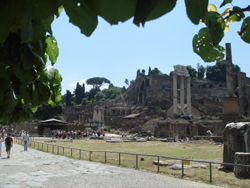Europe
- Travel information from around Europe
New Zealand
- A personal guide to things to do, see, eat and drink in New Zealand
Travel pictures
- Pictures from my travels in Switzerland, Italy and New Zealand
Eclipse chasing
- Essential total eclipse trip planning information from 2010 to 2019
Taranaki pictures
- A gallery of pictures from my travels in Taranaki
Berne
- Information on and about Berne
Marlborough Sounds - sunset seen from the Interislander
- Sunset over the Marlborough Sounds in New Zealand seen from the Interislander ferry
Belgium
- Travel information on and about Belgium
France
- Travel information on and about France
Germany pictures
- A gallery of pictures from my travels in Germany
 My personal advise on what to do and see in Rome
My personal advise on what to do and see in Rome
 Mt Egmont seen from the King Edward Park playing fields in Stratford
Mt Egmont seen from the King Edward Park playing fields in Stratford
 The Stratford Glockenspeil in Taranaki
The Stratford Glockenspeil in Taranaki
 The Antelope - your local, dog friendly, beer friendly pub
The Antelope - your local, dog friendly, beer friendly pub
 Must see ancient monuments around Rome
Must see ancient monuments around Rome
 Historical information about the gothic Antwerp Cathedral
Historical information about the gothic Antwerp Cathedral
 What to see, where to stay and eat in historic Antwerp
What to see, where to stay and eat in historic Antwerp
 Recommended hotels in Vienna, Salzburg and Bregenz
Recommended hotels in Vienna, Salzburg and Bregenz